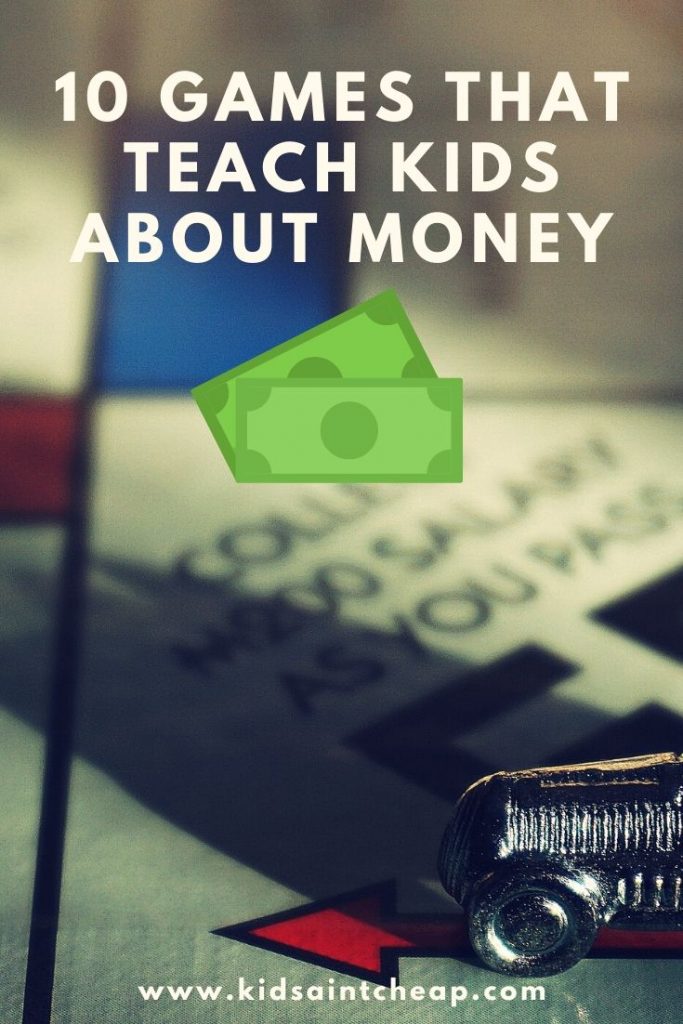Let’s be honest. Hoping children learn via parent lecture is unlikely and boring. Kids don’t listen, and parents get frustrated. But there is a fun way to teach kids about things that doesn’t feel like learning—playing games. If you want to teach your kids how to behave responsibly financially, don’t lecture. Instead, play games that teach kids about money.
Classic Board Games That Teach Kids About Money
My favorite place to start when using games to teach about money are the classic games. You know, the ones we grew up playing.
Monopoly
This classic game teaches your kid the value of location, location, location when buying land. It also teaches kids about the importance of having rental income. And of course, your kids learn about property taxes, stocks, and income.
The only drawback to this game (and some don’t see it as a drawback) is that it can take a long time to play, upwards of an hour or longer.
Life
In The Game of Life, kids choose whether to go to college or go right to work. They also learn about the importance of insurance and avoiding loans. The stock market also plays a role in the game.
One thing I find confusing is that the more kids you have, the more money you seem to make. I haven’t found that to be true in real life!
Pay Day
In Pay Day, the board is set up like a calendar month. Players can choose to buy deals such as a pizza joint for $800. Then, later in the game, they can choose to sell it and make $12,000. Players also get bills in the mail and have to pay them. Throughout the game, players can borrow money from the bank or other players, but they need to agree on the terms.
This is a great game for teaching kids about investing and borrowing. Parents may like it because you can choose how many months to play. The more months you play, the longer the game goes.
Newer Board Games That Teach Kids about Money
Beyond the classic games mentioned above, there are several new board games that teach kids about money.
Cashflow for Kids
This game was created by Robert Kiyosaki of Rich Dad, Poor Dad. The game is suitable for kids ages 6 and older. The board is fairly simple. Kids land on a green or red space or a dollar sign. When they land on a green space, something positive happens to their financial situation. For instance, they can choose to buy a stock and get passive income. If they land on a red, they have to pay an expense. The dollar sign gives them a payday, and this is also when they can get their passive income.
While the board is simple, this game is great for teaching kids about positive, long-term uses of your money and negatives uses of it.
The Allowance Game
Designed for ages 5 to 10, The Allowance Game teaches kids about earning and spending money as they travel around a board. They might spend money for movie tickets and earn money for losing a tooth. They can also put their money in the bank and earn interest.
The money that is used resembles real United States money, so it’s easy for young kids to learn how to differentiate the different bills and coins, too.
Act Your Wage Game
Followers of Dave Ramsey will love the Act Your Wage Game, especially if you’d like to easily teach your children Ramsey’s Baby Steps. When you play the game, you’re given a life situation—how much you make per year and if you’re married or not as well as basic bills such as food and utilities. You also draw debt cards.
You follow Ramsey’s Baby Steps to get yourself out of debt and in a financially secure position. Along the way, you’ll fill envelopes so you can spend cash rather than using credit.
Online Games
You can also find games that teach kids about money by going online.
Rich Kid Smart Kid
The Rich Kid Smart Kid site (from the makers of the board game Cashflow for Kids) has several mini-games including:
- Jesse’s Ice Cream Stand
- Reno’s Debt Dilemma
- Ima’s Pay Yourself 1st
- Jesse’s Big Change
These microgames teach kids entrepreneurship, debt management, and how to start an emergency fund.
Peter Pig’s Money Counter
Peter Pig’s Money Counter is ideal for 5 to 8-year olds who are learning to add and subtract money. Kids need to put the money in different jars, and then they can buy things such as clothes for the pig. By doing the various activities, kids learn how to add and subtract money.
Financial Football
Financial Football taps into some kids’ love of the NFL to help teach them about finances. The game has three different levels:
- Rookie (ages 11-14)
- Pro (ages 14-18)
- Hall of Fame (ages 18+)
To go down the football field, players must answer financial questions. This game was created by VISA in conjunction with Drew Brees, who created several of the questions in the game.
If you homeschool, you can dig even deeper with this game, as there are also lesson plans and pre and post-tests available.
The Playoff
The Playoff is designed for kids ages 14+. In this immersive game, you choose between two vloggers, Alex and Jess. You manage their finances and deal with unexpected events like getting robbed all while trying to develop a video in just three days. Whoever ends the game with the most money wins.
Just like Financial Football, this game has lesson plans, so it could be used in schools or if you homeschool.
Final Thoughts
Teaching your kids about money is challenging. Sure, they’ll watch how you handle your money, but they may need more instruction for how to handle their money wisely. Luckily, there are many games that teach kids about money. Your kids can learn and face natural consequences through the game before they do so in real life. Then, when they’re teens and young adults, they hopefully will know how to manage money responsibly.
Melissa is a writer and virtual assistant. She earned her Master’s from Southern Illinois University, and her Bachelor’s in English from the University of Michigan. When she’s not working, you can find her homeschooling her kids, reading a good book, or cooking. She resides in Arizona where she dislikes the summer heat but loves the natural beauty of the area.

